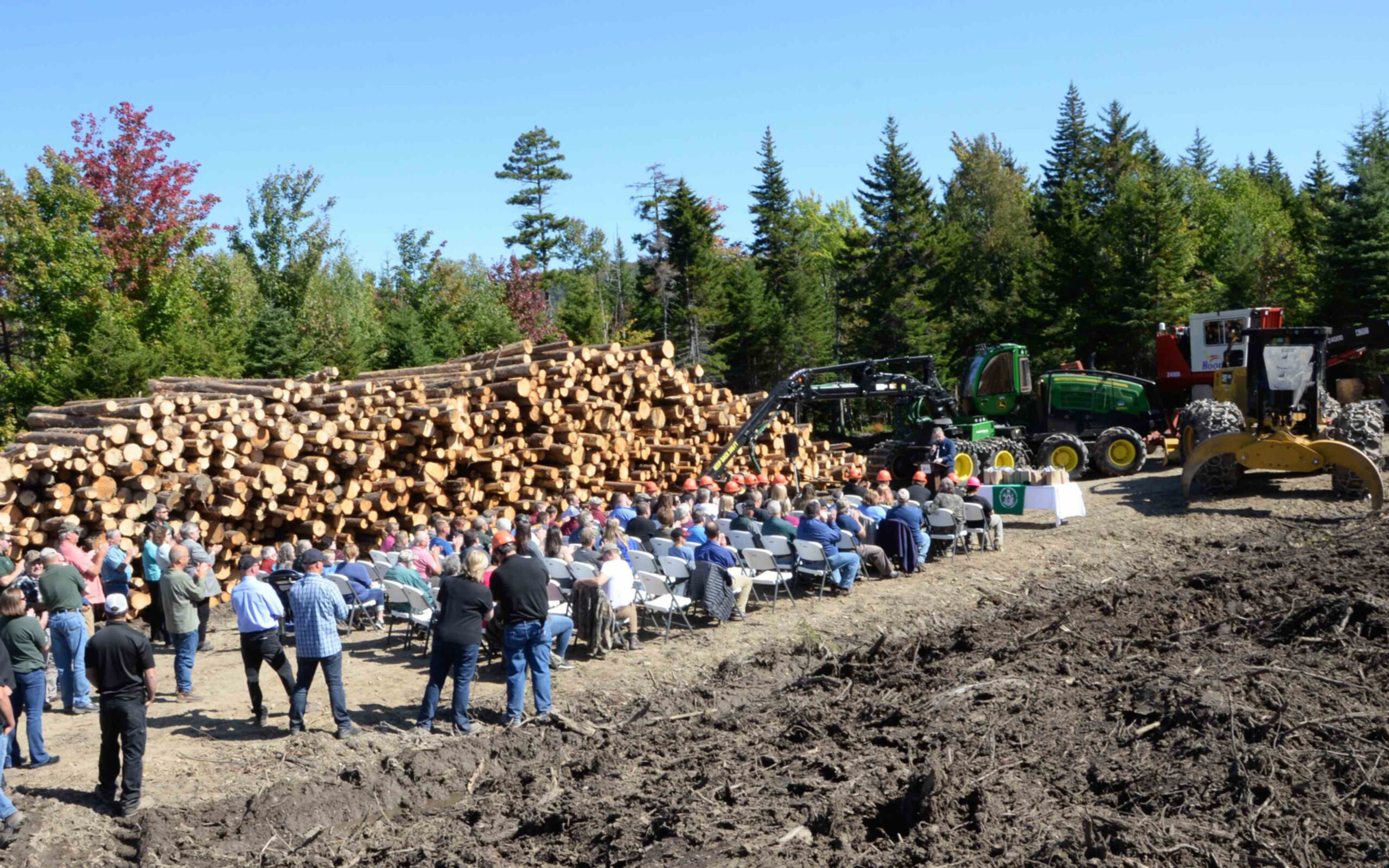
COPLIN, Maine — Fifteen graduates of Maine’s only post-secondary training program for operators of mechanized logging equipment were recognized, Thursday, Sept. 19, at a ceremony in the woods of western Maine, where they spent weeks harvesting timber using state-of-the-art machines like those they will encounter in the logging industry.
Friends and family members of the students were joined by members of the Professional Logging Contractors of Maine (PLC); representatives of Northern Maine Community College, including President Tim Crowley; state officials including Commissioner of Maine’s Department of Agriculture, Conservation and Forestry Amanda Beal and Maine State Forester Patty Cormier; and industry sponsors to share a proud day with the students who completed the program’s rigorous requirements.
Graduates included: Travis Merritt of Houlton, Patrick Prescott of Livermore, Garrett Colbath of Exeter, Michael Schools of Littleton, Jaden Castonguay of Livermore, Ahren Harrison of Stacyville, Payton Ross of Rangeley, Cameron Favreau of Pittston, Andrew Cole of New Limerick, Tylar Pickering of Byron, William Perreault of Chesterville, Tiahna Cyr of Caribou, Corey White of Rumford, Jessica Michalik of Madison, and Logan Malm of Caribou.

Fifteen graduates of the collaborative Mechanized Logging Operations Program pose after ceremonies Thursday, Sept. 19, in the woods of western Maine.
(Courtesy of Professional Logging Contractors of Maine)
The Mechanized Logging Operations Program was launched in 2017 through a partnership between three state community colleges (NMCC, Eastern Maine Community College and Washington County Community College), the PLC, and industry partners. This is the third class to complete the program.
“This program provides a direct pathway to a good-paying, exciting career in the Maine woods at a time when there is huge demand for new workers,” said Dana Doran, executive director of the Professional Logging Contractors of Maine.
“There is no better or more efficient way to gain the experience and knowledge you need to become an equipment operator in the logging industry. These students should be proud of this achievement and expect to reap significant professional rewards from it, and the many contributors to the success of this program should be proud that it is affording this opportunity and offering such a quality experience that every student that began the program this summer finished it – a 100 percent completion rate,” said Doran.
“This program is a great example of how workforce needs can be addressed when education, industry and government work together,” said NMCC’s Crowley. “These students will not only be contributing to the logging industry but also to the economy and quality of life, in Maine.”
The program gives students a broad overview of the most common mechanical systems found in modern timber harvesting equipment, and an understanding of the variables of timber growth, tree species, and markets. It also includes a strong emphasis on safety.
Students who are accepted into the program pay no tuition, but are responsible for transportation, housing, and food costs. Personal Protective Equipment (PPE) is provided by the program.
While the logging industry has seen some contraction in recent years due to the loss of pulp and paper mills, the industry is rebounding and the demand for skilled operators of the feller bunchers, harvesters, grapple skidders, forwarders, delimbers, and other mechanized logging equipment that now harvests 95 percent of all timber in Maine is strong. Many current operators are reaching retirement age and the steep costs of training new operators is driving up demand and wages.
The hands-on experience students gain operating equipment for weeks in the woods is something unavailable anywhere else in Maine and neighboring states.
The new program is working in tandem with the state’s current vocational training system and is expected to draw many of its students from within the logging industry itself as well as from Maine’s four high school vocational logging programs. For the first time, logging operators are being trained similarly to other advanced trade occupations with a high school and postsecondary approach.
It generally takes at least a year of training and experience before an operator becomes skilled enough to run mechanized logging equipment safely and efficiently. The cost for companies to train these operators themselves is approximately $100,000 each.
It was for this reason that the PLC partnered with the Maine Community College System and industry to create the program. The program has been supported since its inception through Maine Quality Centers, a program to develop and support skilled in-demand and high wage occupations in Maine.
A promotional video for MLOP developed by the PLC gives potential students a good look at the opportunities afforded by the program and the logging industry. It is available on YouTube at https://www.youtube.com/watch?v=eI5YwXiM6Gg.
More information on the program is available online at http://www.nmcc.edu/industry-customized-training/mechanized-forest-operations/.
Learn more about the PLC at www.maineloggers.com.







